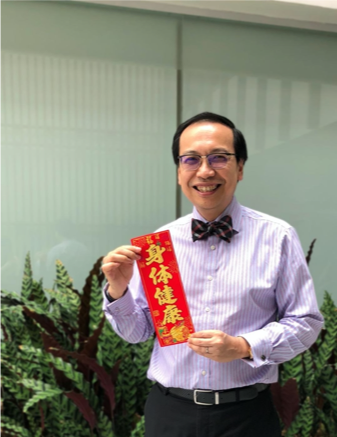President’s Message Dec 2019
Dr Daniel Fung, IACAPAP President, Adjunct Associate Professor, Lee Kong Chian School of Medicine Singapore
2020 is looking to be an exciting year because of a number of reasons; firstly 2020 suggests perfect vision and it will be the year that IACAPAP holds its biennial World Congress. This will happen in July in Singapore, only the 3rd time in our 82-year history that it is held in Asia and the first in which its President is also an Asian. Coincidentally, we will be celebrating the 50th anniversary of the opening of the first child psychiatric facility in Singapore. For Asia, we are entering into a period of social change, of accepting people with mental illness as needing help, not necessarily as a burden or a fearful aspect of society. It represents inclusion and if we as Asians can accept the mentally ill, then we can begin to accept frailty and failure as part of life, not to be repulsed but to be embraced, in helping each other, no one will be left behind.
So for this Christmas, always a time for reflecting for me, it is a time to rest and rejuvenate for the coming year ahead. I have lost several family members and friends this last year, which speaks to our mortality, and in our business, I may not have had enough time to ponder on this. All I know is that life is far yet transient. I keep telling myself that I need to pay attention to my family, and that in the coming year, I should my friendships. We need to remember our relationships and also make time for them. How can we do this with the limited time we have? It is about finding the harmony between work and life. We should allow time for taking a break on important calendar dates, meeting family and friends for meals (there is always three such meals a day) and having time for something we enjoy. My few hobbies are gardening and playing video games. Over the week, I try and spend some time on each. Such recreation allows me to recharge for a busy day or week ahead.

This brings me to IACAPAP’s objectives. To recap, the founders of IACAPAP had prescribed three simple strategies to achieve its goal to “advocate for the promotion of the mental health and development of children and adolescents”. These are stated in our mission, “through policy, practice and research” In the last issue of the Bulletin, I discussed the importance of research, not just the scientific inquiry but also the translation of it into practice. I would like to discuss that translation into practice. We speak of evidence base largely around looking at data and interpreting it. We seldom ask how this new knowledge can be translated into actual practice. Take for example the prevalence of mental illness. The figure of 1 in 7 young persons have a mental illness is spoken and we then say that there is a treatment gap which can be up to 90% in some conditions. But true practice means that we can take this data and develop an ecosystem to support such individuals rather than lament the lack of resources for help. Can we approach the practice of child psychiatry scientifically?
There is a branch of research called implementation science which is described as “the study of methods and strategies to promote the uptake of interventions that have proven effective into routine practice, with the aim of improving population health”. Child mental health professionals need to consider this in identifying barriers and approaches that can help us practice better. The current road map for the training of child psychiatrist is long and arduous, and in the most advanced developed countries, a costly and resource depleting effort. Instead of insisting on developing child psychiatrists in a traditional format, we may need to consider developing a series of competencies which are necessary to help us identify mental illnesses, provide care opportunities for help and develop ecosystems to sustain that help over time. Competency based training is already in widespread use by many training programmes. Opening these training to non-physicians will enable a larger resource of manpower to be harnessed to help children and families in need. IACAPAP can become a curator of such competency-based training as we develop our educational portfolio, anchored in our dynamic online textbook, informed by our open access journal and enhanced by our ever-widening professional network. Julie Chilton, as our Presidential Fellow for Global Education, is working closely with Nick Kowalenko and his team who is supporting the iCAMH initiative which was started by the late Henrikje Klasen. We are looking at making iCAMH (which stands for International Child and Adolescent Mental Health) into a recipe for a customizable training curriculum that can be used to create a personalised meal for the provision of child and adolescent mental health service across the globe. It is my sincere hope that this effort will help us interpret the practice of child and adolescent health around the world and that it will not be “lost in translation”.
Incidentally, recover as defined in the Cambridge dictionary, is to “get back something lost”. We should help our youths, recover, the lost sense of meaning and purpose of life, we should help our colleagues and friends, recover the lost opportunities to strengthening the relationships that gives us a sense of belonging, and we should recover the lost moments to rest and sleep, and dream of a better future.

